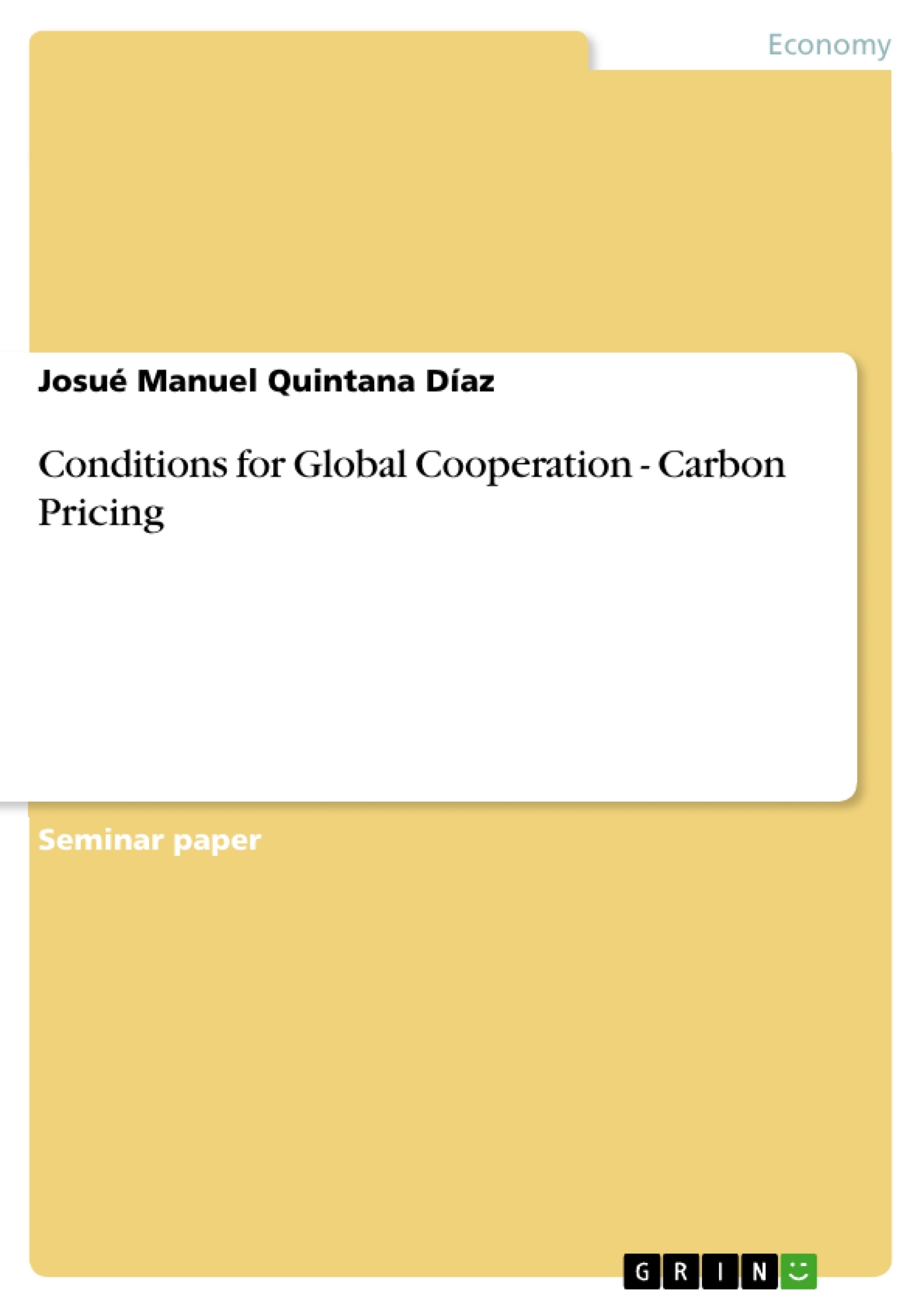This academic paper targets the intergenerational risk sharing dilemma of the current international policy effort to establish conditions of global cooperation for a global carbon price which could, with an adequate carbon-pricing framework, reduce and share cost of mitigation in an efficient, effective and equitable way helping to decouple growth from greenhouse gas emissions.
Inhaltsverzeichnis (Table of Contents)
- 1. INTRODUCTION: „THE GREATEST EXAMPLE OF MARKET FAILURE”
- 2. CARBON PRICING AND EMISSIONS MARKETS IN PRACTICE
- 3. FRAMEWORK FOR UNDERSTANDING INTERNATIONAL COLLECTIVE ACTION FOR CLIMATE CHANGE
- 3.1 UNDERSTANDING INTERNATIONAL COLLECTIVE ACTION
- 3.2 EXISTING INTERN. ARRANGEMENTS FOR GLOBAL COOPERATION ON CLIMATE CHANGE
- 3.3 BUILDING AND SUSTAINING COORDINATED GLOBAL ACTION ON CLIMATE CHANGE
- 4. CREATING A GLOBAL PRICE FOR CARBON
- 4.1 REDUCING THE COSTS OF MITIGATION THROUGH FRAMEWORK EFFICIENCY
- 4.2 SHARING THE COSTS OF MITIGATION
- 4.3 THE EXPERIENCE OF THE KYOTO PROTOCOL
- 4.4 BUILDING ON AND EXPANDING THE KYOTO PROTOCOL FRAMEWORK
- 4.5 INTERACTION WITH THE INTERNATIONAL TRADE REGIME
- 5. CONCLUSION: EQUITABLE INTERGENERATIONAL RISK SHARING
Zielsetzung und Themenschwerpunkte (Objectives and Key Themes)
This paper examines the challenges and opportunities of establishing a global carbon price to address climate change. The author analyzes the economic implications of climate change, emphasizing the need for international cooperation to effectively mitigate greenhouse gas emissions. The paper delves into the use of carbon pricing mechanisms, including cap-and-trade systems and emission taxes, and explores the framework for understanding international collective action on climate change.
- Intergenerational Risk Sharing
- Carbon Pricing and Emissions Markets
- International Collective Action for Climate Change
- Mitigation Costs and Framework Efficiency
- The Role of the Kyoto Protocol
Zusammenfassung der Kapitel (Chapter Summaries)
- Chapter 1: Introduction This chapter introduces the concept of climate change as a "market failure" and emphasizes the importance of global cooperation to address the issue. It highlights the economic impact of climate change, including the need for emission reductions in both developed and developing countries.
- Chapter 2: Carbon Pricing and Emissions Markets in Practice This chapter explores various approaches to carbon pricing, including tax and trading schemes, and discusses their effectiveness in driving emission reductions. It examines the role of emission trading schemes (ETS) in creating market incentives and promoting cost-effective resource allocation.
- Chapter 3: Framework for Understanding International Collective Action for Climate Change This chapter examines the framework for understanding international collective action on climate change. It delves into the challenges of international cooperation, including free-riding incentives and the need for effective mechanisms to coordinate global efforts.
- Chapter 4: Creating a Global Price for Carbon This chapter focuses on the creation and implementation of a global carbon price. It explores mechanisms to reduce mitigation costs through framework efficiency, share the burden of mitigation, and build upon the existing Kyoto Protocol framework. The chapter also examines the interaction between carbon pricing and the international trade regime.
Schlüsselwörter (Keywords)
Key terms and concepts explored in this work include: carbon markets, carbon pricing, emission trading, externalities, flexible mechanisms, framework, free-riding, game theory, intergenerational risk sharing, market failure, moral hazard, Kyoto Protocol, price signals, public goods.
Frequently Asked Questions
Why is climate change described as a "market failure"?
Because the market does not account for the negative externalities of greenhouse gas emissions, meaning the costs of climate damage are not reflected in the price of carbon-intensive goods.
What is the goal of global carbon pricing?
The goal is to create a financial incentive to reduce emissions efficiently and effectively, helping to decouple economic growth from greenhouse gas emissions.
What are the two main types of carbon pricing?
The two main approaches are carbon taxes, which set a price on emissions, and cap-and-trade systems (emissions trading), which set a limit on total emissions and allow markets to determine the price.
What is intergenerational risk sharing in climate policy?
It refers to the dilemma of how current generations should bear the costs of mitigation to reduce the environmental and economic risks for future generations.
How did the Kyoto Protocol influence global cooperation?
The Kyoto Protocol established the first international framework for emission reductions and flexible market mechanisms, providing a foundation for subsequent coordinated global actions.
- Quote paper
- M.Sc Josué Manuel Quintana Díaz (Author), 2010, Conditions for Global Cooperation - Carbon Pricing, Munich, GRIN Verlag, https://www.grin.com/document/152844



